The mission of Catholic International University is to communicate the mind and heart of the Church in support of the New Evangelization. In pursuit of Truth, the university educates learners globally through personal and relational online programs in Catholic theology and faith development, liberal arts, science, and technology, to foster faith, leadership, and service for the Church and the world.
The Catholic Church has been operating universities for a thousand years and was involved in education for a thousand years before that. When John Paul II issued the apostolic constitution Ex Corde Ecclesiae (15 August 1990), he restated the tradition and experience of the Church as it relates to Catholic universities.
He explained the role of faith in the working of the faculty, staff, and students. He also set down how research and teaching are illuminated by faith. The university is an intellectual community, but it is intellectual in a uniquely Catholic way because it respects the truth. As Pope Benedict XVI said, “Only in faith can truth become incarnate and reason truly human, capable of directing the will along the path of freedom” (cf. Spe Salvi, 23). Faith nourishes and guides the Catholic university and makes it a genuine intellectual community. Catholic International University takes Ex Corde Ecclesiae as its guiding light.
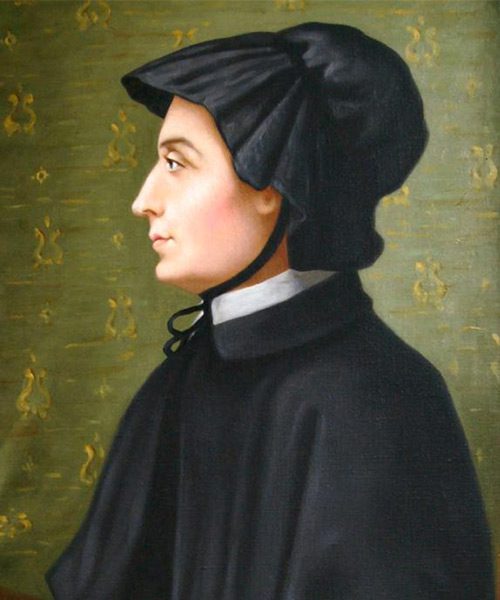
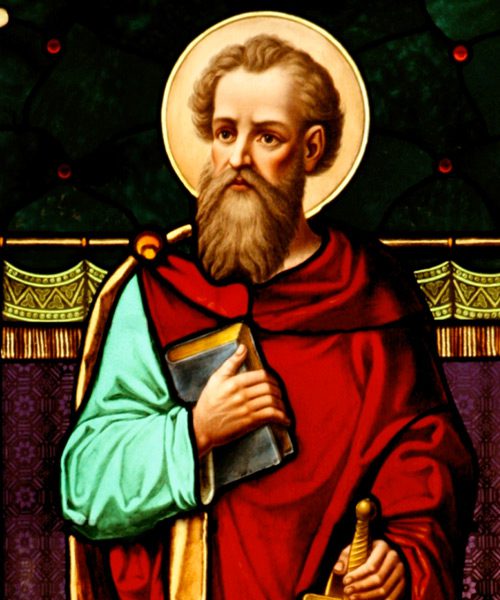
Catholic International University through its academic programs, its expertise in distance education, and its commitment to a strong learning community, fosters an encounter with the living God in Jesus Christ who is the “way, the truth, and the life.” (Jn 14:6)
In his Apostolic Constitution Ex Corde Ecclesiae, Pope Saint John Paul II stated that, “[a Catholic university] shares that Gaudium de Veritate, so precious to St. Augustine, which is that joy of searching for, discovering, and communicating truth in every field of knowledge.” (Ex Corde Ecclesiae, 1)
Pope Emeritus Benedict XVI reminded Catholic educators, “First and foremost every Catholic educational institution is a place to encounter the living God who in Jesus Christ reveals his transforming love and truth.” (cf. Spe Salvi 4). (Address, Catholic University of America, April 17, 2008)
Pope Francis described the goal of Catholic education, “To prepare hearts, that the Lord might manifest Himself…” (Address: Vatican Global Education Conference, November 21, 2015)
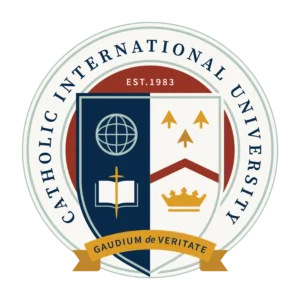 The seal of Catholic International University combines elements from the arms of Bishop Thomas J. Welsh, Catholic International’s founder, with symbols that represent our patron saints and our universal reach through online learning.
The seal of Catholic International University combines elements from the arms of Bishop Thomas J. Welsh, Catholic International’s founder, with symbols that represent our patron saints and our universal reach through online learning.
The three collegiate colors are red, blue, and black signifying: red for the Holy Spirit, source of wisdom and Truth; blue for Mary, seat of wisdom; and black for the ascetical discipline necessary for growth in wisdom and understanding of Truth.
The right side of the shield is from Bishop Welsh’s coat of arms. The arrowheads are adapted from the Welsh family coat of arms. The chevron with an arrowhead signifies the Bishop’s patron, St. Thomas the Apostle. The crowned humilitas is taken from the coat of arms of St. Charles Borromeo, the seminary where Bishop Welsh served as rector.
The book and sword are symbolic of our two patron saints: the sword for St. Paul, the Church’s first distance educator, and the book for St. Elizabeth Ann Seton, the founder of the Catholic school system in the United States. Printed on the pages of the book are the words Ex Corde Ecclesiae – the Apostolic Constitution issued by Blessed Pope John Paul II that guides Catholic International as an intellectual community and Catholic university.
Catholic International’s commitment to providing accessible education is symbolized by the globe. Through our online campus, our students and faculty come together to create a global learning community dedicated to the search for Truth and love of knowledge for the glory of God.
Beneath the seal lies the motto of the university, Gaudium de Veritate – Joy from the Truth, a phrase from Saint Augustine, expressing the spirit of the university.
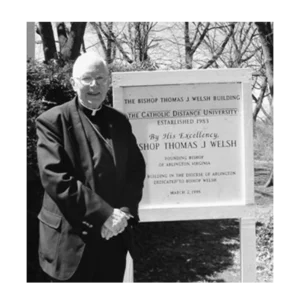
Catholic International University was established in 1983 under the leadership of Bishop Thomas J. Welsh, founding bishop of the Diocese of Arlington. At the time, Bishop Welsh also served as North American Chairman of the Pontifical Council for the Family and believed that families should be able to deepen their knowledge of the Catholic faith in the warmth, security, and convenience of home, giving an example to children of the importance of learning more about our faith throughout life.
Bishop Welsh was deeply committed to Catholic education and to the education of lay people whose distinct vocation in the world was clearly articulated in the documents of the Second Vatican Council. Bishop Welsh worked tirelessly in the Diocese of Arlington and later as the Bishop of Allentown, Pennsylvania, to provide opportunities for education and spiritual growth. Not only did Bishop Welsh believe that distance education was an innovative approach to adult religious education, but the Holy See in November 1983 praised Catholic International for carrying out the mandate of Christ to “Teach all Nations” using new methods and approaches and approved Catholic International as a Pontifical Institute with the authority to award the Pontifical Diploma, later known as the Catechetical Diploma. This was the first time that the Diploma was awarded exclusively through correspondence education.
In 2004, St. John Paul II reminded a group of American bishops, “It is of utmost importance, therefore, that the Church’s institutions be genuinely Catholic: Catholic in their self-understanding and Catholic in their identity.” Catholic International’s Catholic identity has been at the heart of all we do since our founding, as articulated by St. John Paul II in his Apostolic Constitution On Catholic Universities, or in Latin, Ex Corde Ecclesiae (meaning “from the heart of the Church”).
Catholic International’s Board has always included bishops and priests along with a majority of lay people and religious committed to the mission of Catholic International. The Bishop has ultimate authority over Catholic International’s curriculum.
For 40 years, Catholic International has educated thousands of students worldwide through high-quality programs steeped in the Catholic intellectual tradition that not only prepare them for professional success but also nurture a love for Jesus Christ. Catholic International fosters a strong, vibrant global learning community. Our faculty and staff are strongly committed to the mission of Catholic International and to fostering a life-changing encounter with the living Word of God, Jesus Christ.


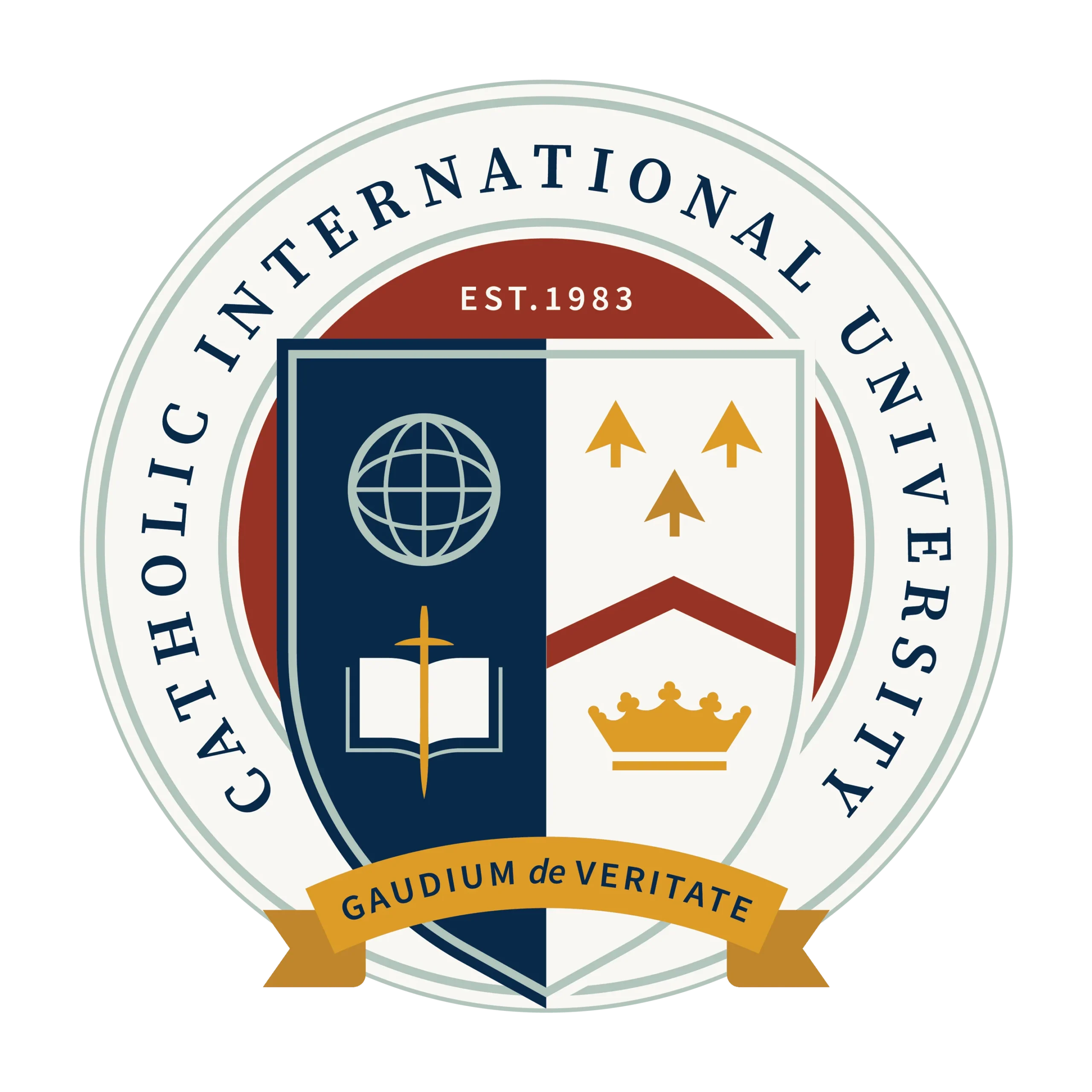

To assess its primary mission, Catholic International is committed to ongoing assessment and evaluation of its academic programs. This assessment and evaluation process is directed by the Assessment Committee (AC) and assists the faculty and staff in addressing the alignment of institutional outcomes with degree program goals, department (concentration) objectives, and course syllabi. The AC also develops assessment instruments, rubrics, and juried assessment tools and provides data analyses for administration and faculty review that lead to institutional improvement. In addition, the Board of Trustees annually engages in the assessment of its effectiveness in guiding the University to fulfill its mission.




